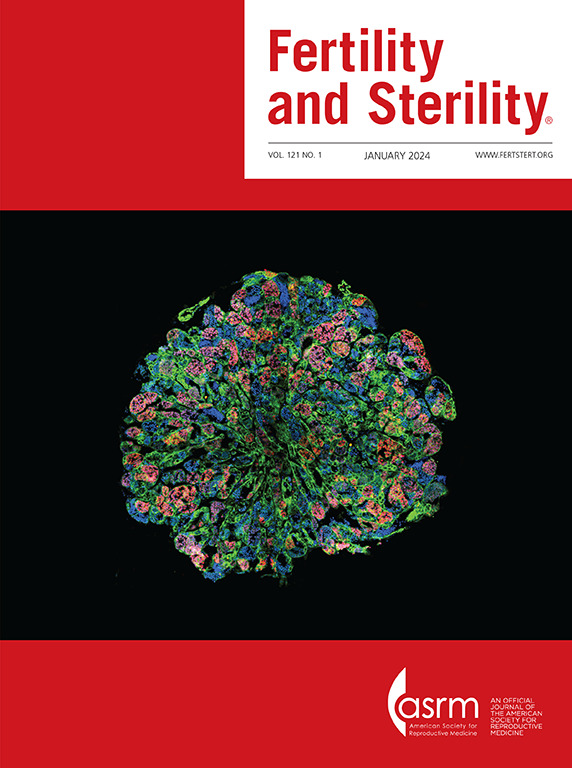多囊卵巢综合征妇女妊娠相关高血压疾病后高血压的持续存在
IF 6.6
1区 医学
Q1 OBSTETRICS & GYNECOLOGY
引用次数: 0
摘要
目的本研究旨在评估多囊卵巢综合征(PCOS)是否会增加有妊娠高血压病(PHD)病史的女性发生持续性高血压的风险。设计一项单中心、前瞻性队列研究。受试者共纳入124例PHD患者。诊断的基础是妊高征(PIH)或先兆子痫(PE)。所有PHD患者均筛查PCOS诊断,根据患者病史和临床报告确诊或排除PCOS。将62例诊断为PCOS的患者(n=62,例)作为研究组。根据年龄、体重指数和不孕症治疗进行一对一匹配后,还纳入了62名无PCOS的对照患者。根据国家和国际标准诊断。主要结局指标:主要结局指标为分娩后12个月高血压的持续情况。次要结局包括分娩后3个月和6个月的高血压持续性、妊娠并发症和抗高血压治疗数据。结果分娩后12个月,PHD合并PCOS患者发生持续性高血压的风险显著高于对照组(调整优势比[aOR] 4.51, 95%可信区间[CI] 1.43-14.19, p=0.010)。6个月时,该风险也显著升高(aOR 5.01, 95% CI 1.63-15.94, p=0.005)。此外,与对照组相比,妊娠PCOS患者的发病时间更早(30.0周vs. 31.1周,p=0.013),需要更高剂量的硝苯地平(37.5 mg vs. 30 mg, p=0.001),并且更有可能接受多种药物联合降压治疗(24.2% vs. 9.7%, p=0.032)。PCOS组胎儿生长受限(19.4% vs. 6.5%, p=0.033)、多普勒测速异常(16.1% vs. 4.8%, p=0.041)和剖宫产(35.5% vs. 19.4%, p=0.019)的发生率也显著高于对照组。结论pcos与有PHD病史的患者发生持续性高血压的风险增加有关。建议对多囊卵巢综合征患者进行孕前预防干预、孕期专项监测和长期随访。本文章由计算机程序翻译,如有差异,请以英文原文为准。
Persistence of hypertension after pregnancy-related hypertensive disorders in women with polycystic ovary syndrome.
OBJECTIVE
This study aims to assess whether polycystic ovary syndrome (PCOS) increases the risk of persistent hypertension in women with a history of pregnancy-induced hypertensive disorder (PHD).
DESIGN
A single-center, prospective cohort study.
SUBJECTS
A total of 124 patients with PHD were enrolled. PHD was diagnosed based on the presence of pregnancy-induced hypertension (PIH) or preeclampsia (PE). All PHD patients were screened for PCOS diagnosis, which was confirmed or excluded based on patient history and clinical reports. Sixty-two patients diagnosed with PCOS (n=62, cases) were included as the study group. After one-to-one matching process based on age-, body mass index-, and infertility treatment, 62 control patients without PCOS were also included.
EXPOSURE
PCOS diagnosis according to National and International criteria.
MAIN OUTCOME MEASURES
The primary outcome was the persistence of hypertension 12 months after delivery. Secondary outcomes included persistence of hypertension at 3 and 6 months from delivery, pregnancy complications and data on antihypertensive treatment.
RESULTS
After 12 months from delivery, the risk of persistent hypertension was significantly higher in PHD patients with PCOS compared to controls (adjusted odds ratio [aOR] 4.51, 95% confidence interval [CI] 1.43-14.19, p=0.010). At 6 months, that risk was also significantly higher (aOR 5.01, 95% CI 1.63-15.94, p=0.005). Additionally, pregnant PCOS patients had an earlier onset of PHD (30.0 vs. 31.1 weeks, p=0.013), required a higher dose of nifedipine (37.5 mg vs. 30 mg, p=0.001), and were more likely to receive antihypertensive therapy with multiple drugs (24.2% vs. 9.7%, p=0.032) compared to controls. The incidence of fetal growth restriction (19.4% vs. 6.5%, p=0.033), abnormal Doppler velocimetry (16.1% vs. 4.8%, p=0.041), and cesarean delivery (35.5% vs. 19.4%, p=0.019) was also significantly higher in the PCOS group compared to controls.
CONCLUSION
PCOS is associated with an increased risk of persistent hypertension in patients with a history of PHD. Preventive interventions before pregnancy, specific pregnancy surveillance, and long-term follow-up should be recommended for women with PCOS.
求助全文
通过发布文献求助,成功后即可免费获取论文全文。
去求助
来源期刊

Fertility and sterility
医学-妇产科学
CiteScore
11.30
自引率
6.00%
发文量
1446
审稿时长
31 days
期刊介绍:
Fertility and Sterility® is an international journal for obstetricians, gynecologists, reproductive endocrinologists, urologists, basic scientists and others who treat and investigate problems of infertility and human reproductive disorders. The journal publishes juried original scientific articles in clinical and laboratory research relevant to reproductive endocrinology, urology, andrology, physiology, immunology, genetics, contraception, and menopause. Fertility and Sterility® encourages and supports meaningful basic and clinical research, and facilitates and promotes excellence in professional education, in the field of reproductive medicine.
 求助内容:
求助内容: 应助结果提醒方式:
应助结果提醒方式:


